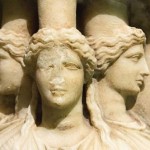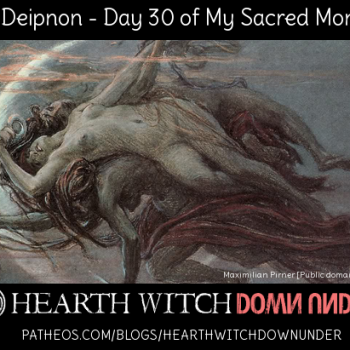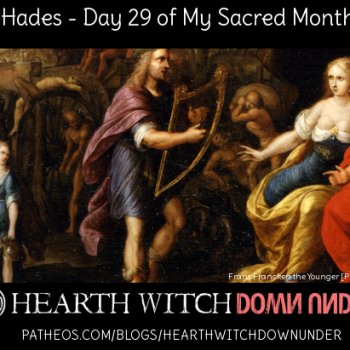It’s an important part of Paganism to know what a deity is “of”. As in, what do They rule over and represent? What are They the God of? While it’s important to not let ourselves try to limit the Gods to Their aspects, it’s still a handy thing to know what things each deity prefers to be involved in.
Some of Prometheus’ aspects are quite obvious, but others I didn’t really notice until I thought deeply about it. First, a lot of what is in this post refers to the mythology of Prometheus – for a quick reminder of His role in myth, take a look at this post from the other week.

Fire
This is extremely obvious, the most famous story about Prometheus is how He stole fire for us and taught us how to use it. In so doing He ended up suffering some pretty awful punishments on our behalf.
Sacrifice and Offerings
As evidenced by the ox trick Prometheus plays on Zeus, it seems pretty obvious that Prometheus is the God of animal sacrifice and other offerings. He is the one responsible for the rules of how we offer to the Gods, what is given and what we keep for ourselves.
STEAM
STEAM is an acronym for Science, Technology, Engineering, Arts and Maths and Prometheus is seemingly responsible for all of them, or our knowledge and understanding of them anyway. According to Aeschylus, Prometheus Himself says, “All arts among the human race are from Prometheus”.
The most obvious of course is smithcraft, which He is said to have taught us when He gave us fire, alongside this we also learned various other crafts, especially those that rely on the use of fire. Beyond this however He is said, via Aeschylus, to have taught us about astronomy, architecture, the art of writing, mathematics, medicine, how to build boats/ships and even how to yoke and train animals for farming and travel.
All of these tie into our scientific and technological development – without mathematics, writing (and by extension reading), we wouldn’t have been able to advance so far in all forms of science and technology, and indeed engineering which relies quite heavily on maths.
As the creator of humanity He is also mentioned when we create life, of the semblance of life. Some of those who work in artificial life or intelligence refer to such as being “Promethean”. But Prometheus is also considered a lesson in not evolving our technology in the wrong way – a good exploration of this theme is Mary Shelley’s Frankenstein, which is also called the Modern Prometheus.
Medicine
As mentioned above, Prometheus is the one who introduced us to medicine, but it goes further than this as well. The big story of Prometheus is His chaining and how an eagle tore out His liver every day, and it grew back during the night. This ties in rather perfectly with the livers literal ability to regenerate.
Much of what Prometheus taught us of healing was apparently through plant and herb lore, so there is perhaps some thanks owed to Him from witches too!
Humanity
Prometheus is our patron and benefactor. He created us, He gave us fire, He taught us many, many things even when He wasn’t supposed to, He convinced Zeus to not kill us all, He made sure our race survived the great flood, He tricked Zeus for us. He risked all for us and suffered thousands of years of torment for us.
Guile, Trickery and Cleverness
Even the quickwitted and tricky Hermes could not persuade Prometheus to speak when He didn’t wish to, or to reveal that which He desired to remain hidden. Hermes is considered the God of trickery, but He acknowledges Prometheus as the “clever and crafty”.
We know of Prometheus’ guile via multiple sources, including the ox trick in sacrifice where He tricked Zeus (who is seen as the cleverest) and in His turning against the Titans to help the younger Gods defeat Them.
Futuretelling and Divination
We can see from the story of Io on Prometheus Bound that Prometheus has the gift of futuretelling. We also know that He was responsible for removing the knowledge of our own individual deaths from us humans, so we could no longer trick our way into the blessed realm if we didn’t deserve to be there. He is also said by Aeschylus to be the one who taught us the art of prophecy and divination including recognising true dreams, observing birds and other animals, reading entrails and many, many other forms.

Intellect
Prometheus’ name is said, by some sources, to mean “forethought”. He is able to think quickly and deeply and see the possible consequences based on certain actions – this is why He abandoned His Titan brethren and joined the Younger Gods in the Titanomachy, because He could see that the Titans were going to lose.
Of course, this aspect is possibly belied by the fact He didn’t see His punishment for stealing fire happen – but then again, He knew there would be some consequences, just not exactly how terrible they would be. He also was able to see exactly how He would be able to free Himself, who would help Him and what He needed to do to make it all happen (helping Io, which in turn would one day produce Herakles etc). Much of His release was bound up in His future vision of Thetis and what would happen if Zeus married Her.
Hope
In some tales, but not all, Prometheus is said (or He says it Himself) that He is responsible for us having hope. When He removed from us our ability to see our own deaths, He replaced it with blind hope. This ties in with His role in the Pandora myth. Though He had no hand her creation, it was His theft of fire that brought that punishment on us and it is perhaps possible (He is a Titan and a God) that He is the one that kept hope in the box.
Selflessness, Boldness
This aspect of Prometheus is shown in the way He defies those who could have quite the negative effect on Him, if They so desire. Again, His ox trick on Zeus and theft of fire (which indeed did have negative consequences) and also His siding with the Younger Gods against the Titans – a very risky endeavour indeed. While His betrayal of the Titans was actually for His own selfishness it was bold, His acts in our defence and to our benefit however can only be seen as selflessness.
At Least I Think So
The following are things I personally have noticed as being themes running through the various myths of Prometheus, that suggest, to me, He has some connection to these things. Whether He actually accepts such designations is another matter entirely!
Theft – The story of the theft of fire does suggest that Prometheus has a connection to theft.
Self-Sacrifice/Martyrdom – In Prometheus Bound, He says of Himself that He knew His actions would not bring good upon Him, but He chose to do them anyway and accept His punishment (though His punishment was more severe than He expected).
Defiance/Rebellion/Individuality – Prometheus is perhaps our greatest example of being defiant, of standing up for the things you believe in, taking a stand in the face of, well, tyranny. This is also an example of going against the flow and not being what is now termed “sheeple” – in many of the things Prometheus did for us against Zeus, He was the only one who stood up for us, the other Gods just went along with what Zeus wanted.
Protecting the Vulnerable – Prometheus wanted nothing more than to protect mankind and make our lives better, this is why He stood against Zeus so many times – openly and slyly. In this He is a great example for standing up for those in need, those less fortunate, those who are vulnerable. Though we might not consider ourselves such now, this was all done before we even knew how to protect ourselves from the weather! We were certainly vulnerable back then and Prometheus was our staunch defender.
Sources and Further Reading
- Hesiod, Theogony
- Hesiod, Works and Days
- Aeschylus, Prometheus Bound
- The Homeric Hymns
- Theoi.com
















